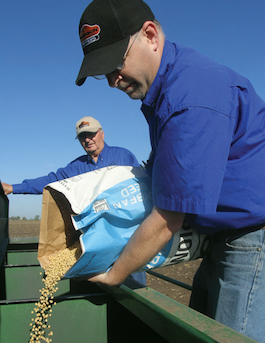Photography by Jeremy Waltner 
Colin Hofer and his father, Vernon, raise beef cattle on 240 acres of pasture and grow corn and soybeans on 400 acres.
During planting this spring, it took 7 minutes for Colin Hofer to drive a tractor from one end of the farm field to another. In those few minutes, he had time for other tasks: prepare his Sunday school lesson, eat lunch, or conduct business on his smart phone.
Meanwhile, the tractor’s autosteer function, guided by the Global Positioning System (GPS), directed the tractor down the row. At the end of the field, Colin put his hand back on the steering wheel and turned the tractor around to head back down the field on the family farm in rural Freeman, S.D.
Farm mechanization has grown over the years, giving Colin and other crop farmers extra time on their hands. He sees more farmers operating sideline businesses during the down time. His real full-time job, he says, is running Rural Manufacturing, which sells farm equipment to other farmers nationwide and internationally.
Crop profits also have grown significantly in recent years. Corn prices are at historical highs, giving farmers extra money in their bank accounts. Colin also finds ways to use this extra income, particularly through something called commodity giving.
They use the farm to test equipment sold through Rural Manufacturing. The GPS autosteer system that drives their tractors is sold by their business. Both the farm and the business are family-run.
Rural Manufacturing began as a side business on the family farm in 1968. In 1976, as the business grew, they moved it to the outskirts of Freeman, a thriving town of 1,300 in the southeast corner of South Dakota. A new building was added in 2011 to provide additional manufacturing space. The business currently has 20 employees – many are family members. Some signature products the company builds are portable corrals for cattle and traditional blue gates. It also sells products ranging from livestock watering containers to GPS devices. Colin believes that product testing on their farm is what gives them creditable product knowledge that they can share with customers.
Crop farming is experiencing a period of extremely good times – financially, that is. While farming and his business are going well, Colin is trying to take advantage of these good times in a unique fashion. He thinks about how his financial returns can benefit not only him, but his church and charitable organizations he supports. Colin likes to give commodity gifts he first learned about this kind of charitable donation during a stint in the mid-1990's as business manager at Freeman Academy, the local Mennonite K-12 school.
“Through my Everence church advocate, Norman Hofer, I discovered commodities could be given through Everence – and no income is recognized for the farmer, but all production expenses could be deducted,” Colin said. He also liked that the proceeds can be distributed to his charities of choice and spread out over several years.
Colin was so taken by the concept he immediately signed up and convinced his father to do so. He has set up multiple donor advised fund accounts through Everence for commodity and other types of gifts. “All it takes, after you have an account, is to call the foundation to inform them of the gift,” Colin said. “After the sale, the buyer sends the check to the foundation, which is deposited in your account. The foundation distributes the money as you direct.”
Freeman Academy isn’t the only beneficiary of Colin’s enthusiasm for giving. Two years ago, Colin became chairperson at his congregation, Hutterthal Mennonite, and has encouraged members to use Everence’s donor advised fund for capital campaigns for improvements at the church and parsonage. In June 2011, Colin became the treasurer for Central Plains Mennonite Conference and has since encouraged constituents to use charitable fund accounts.
“Any business can use the accounts,” said Colin, who created a donor advised fund account last year for Rural Manufacturing. “In the fat years you can ‘store’ charitable dollars, so in the lean years you can maintain your level of giving to charities. For farmers, there are not a lot of legitimate tax-saving options, but commodity giving is one of them.”
Heather Haggerty has known Colin Hofer for many years and is office manager for Dan Haggerty Insurance Agency, Freeman, S.D.

